Charles E W Bean, Diaries, AWM38 3DRL 606/261/1 - 1929 - 1930 - Part 8
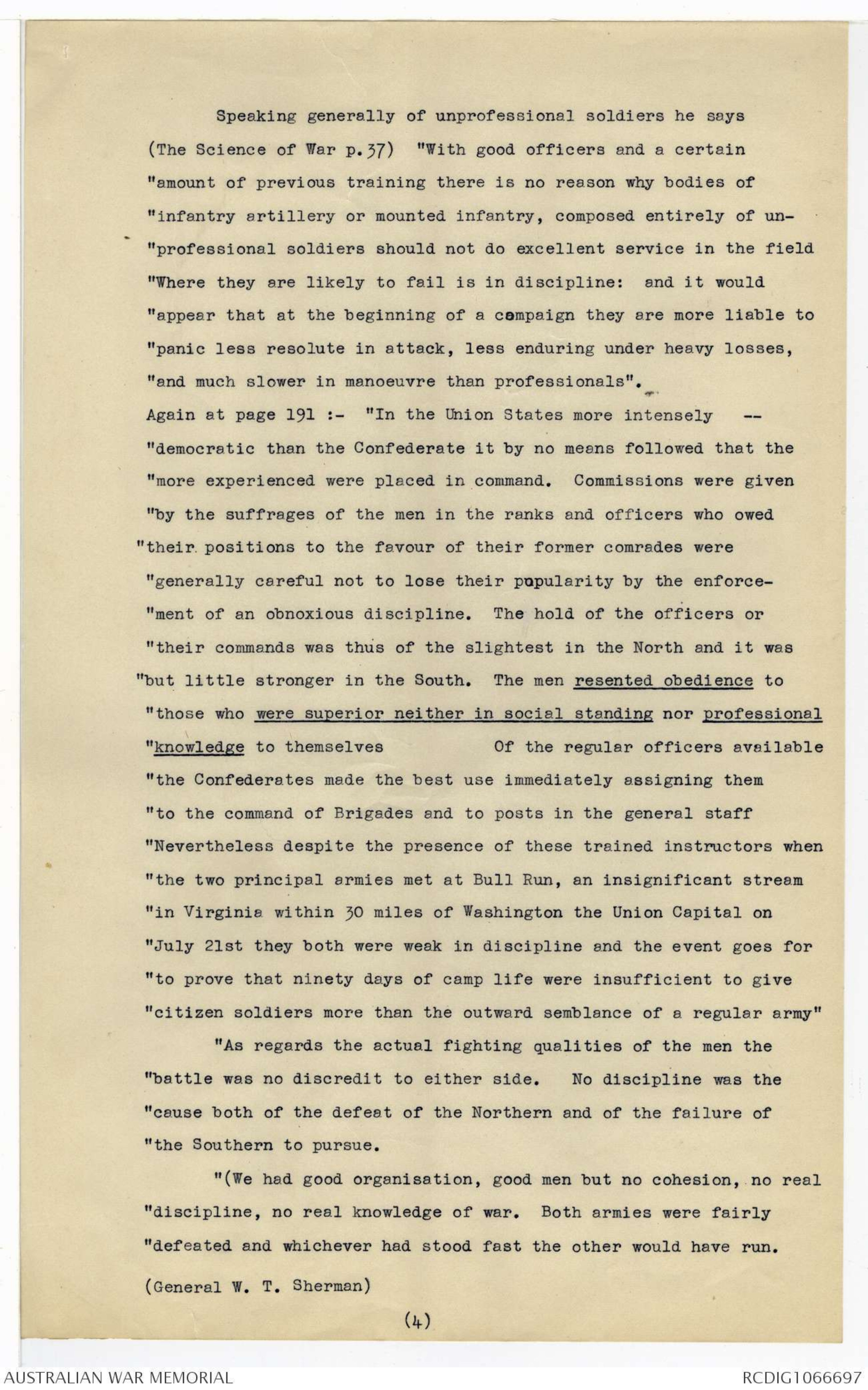
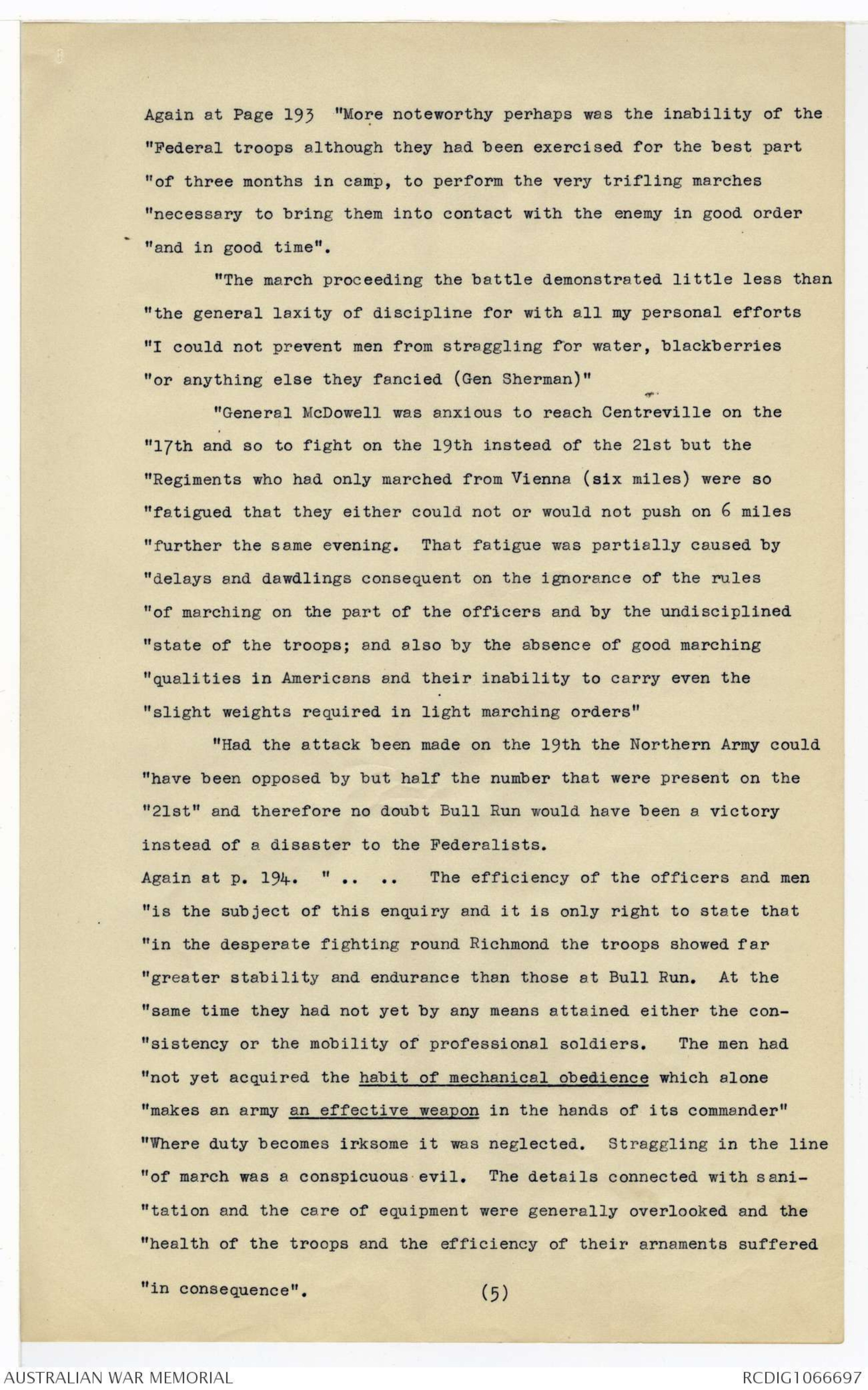
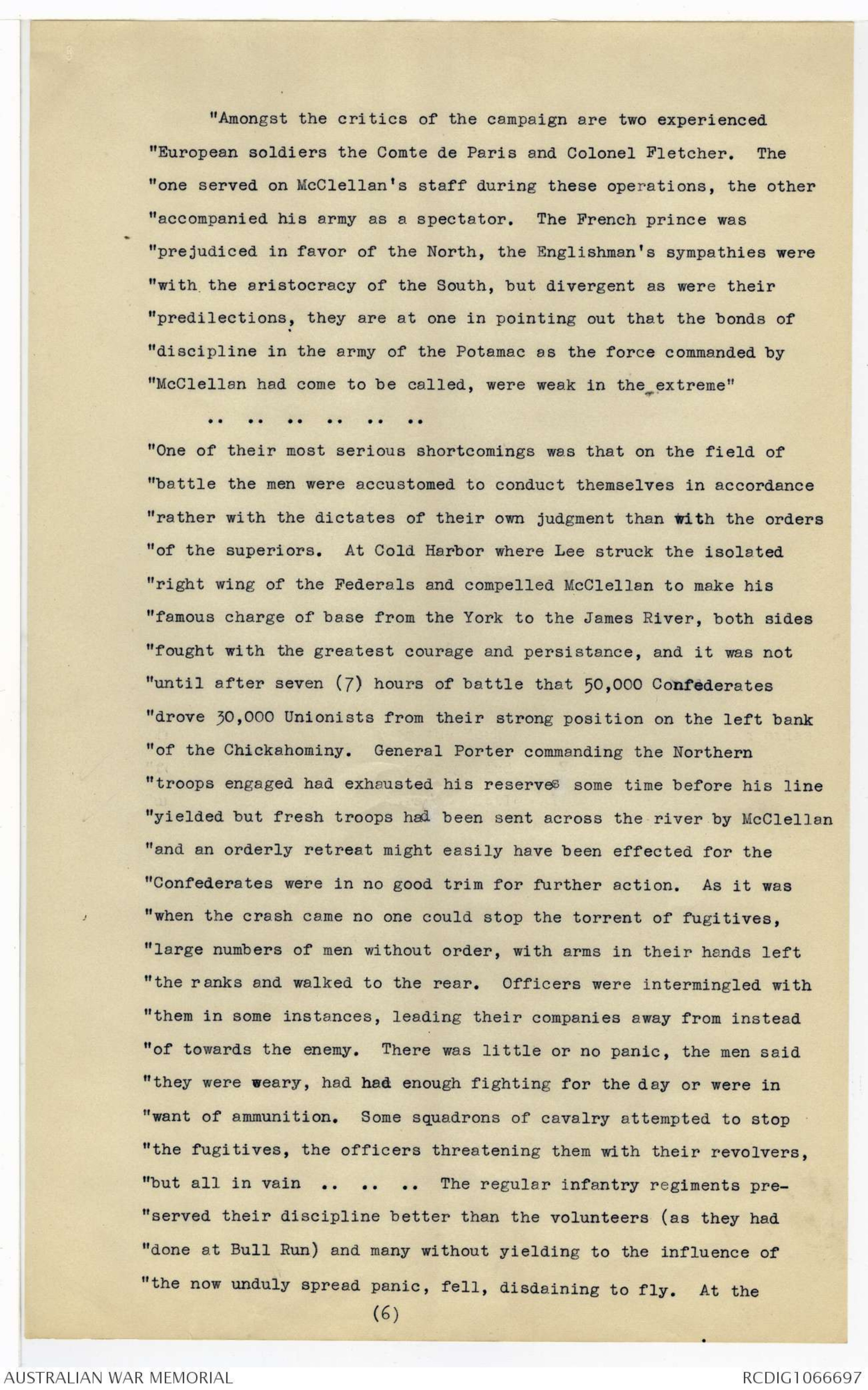
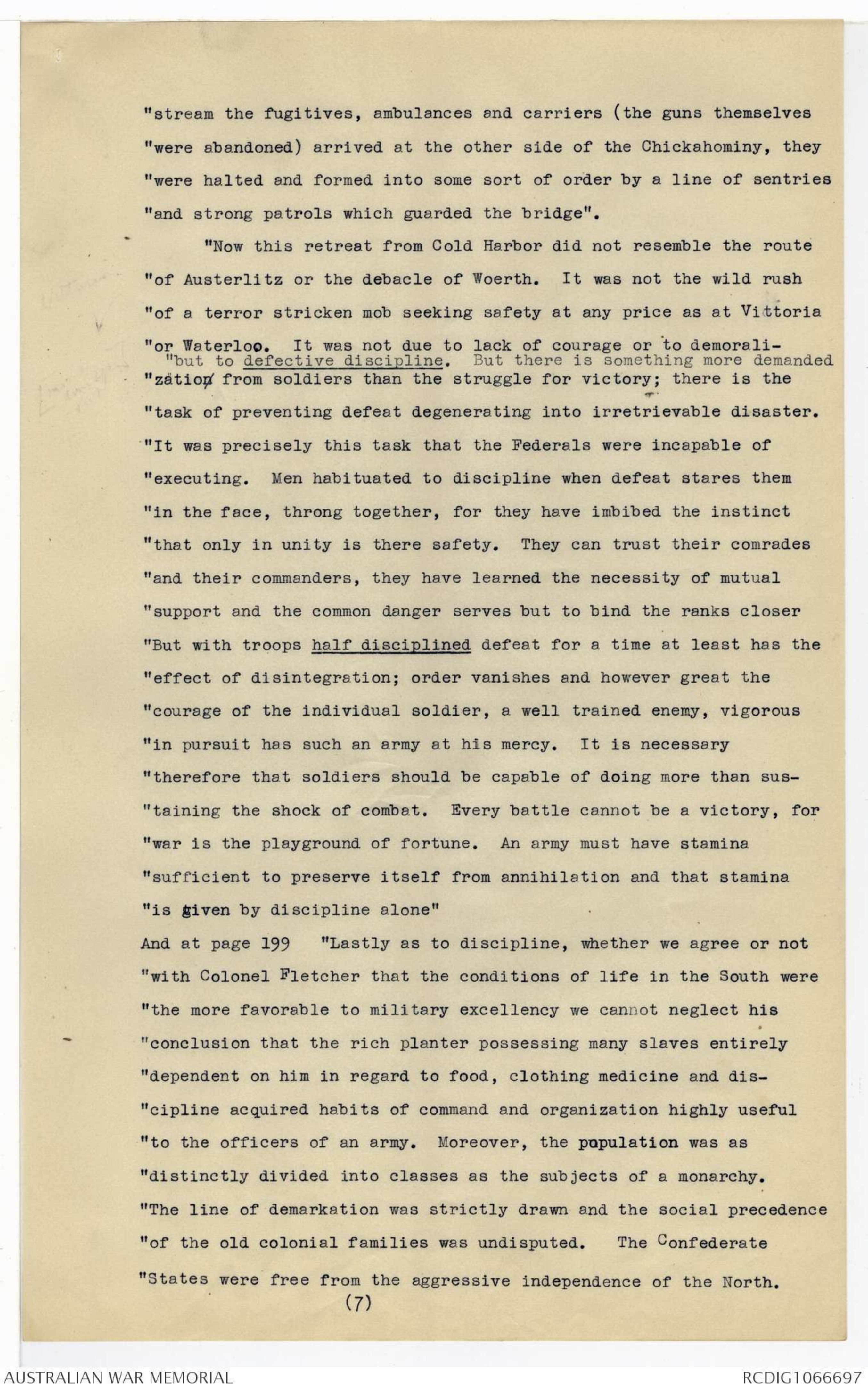
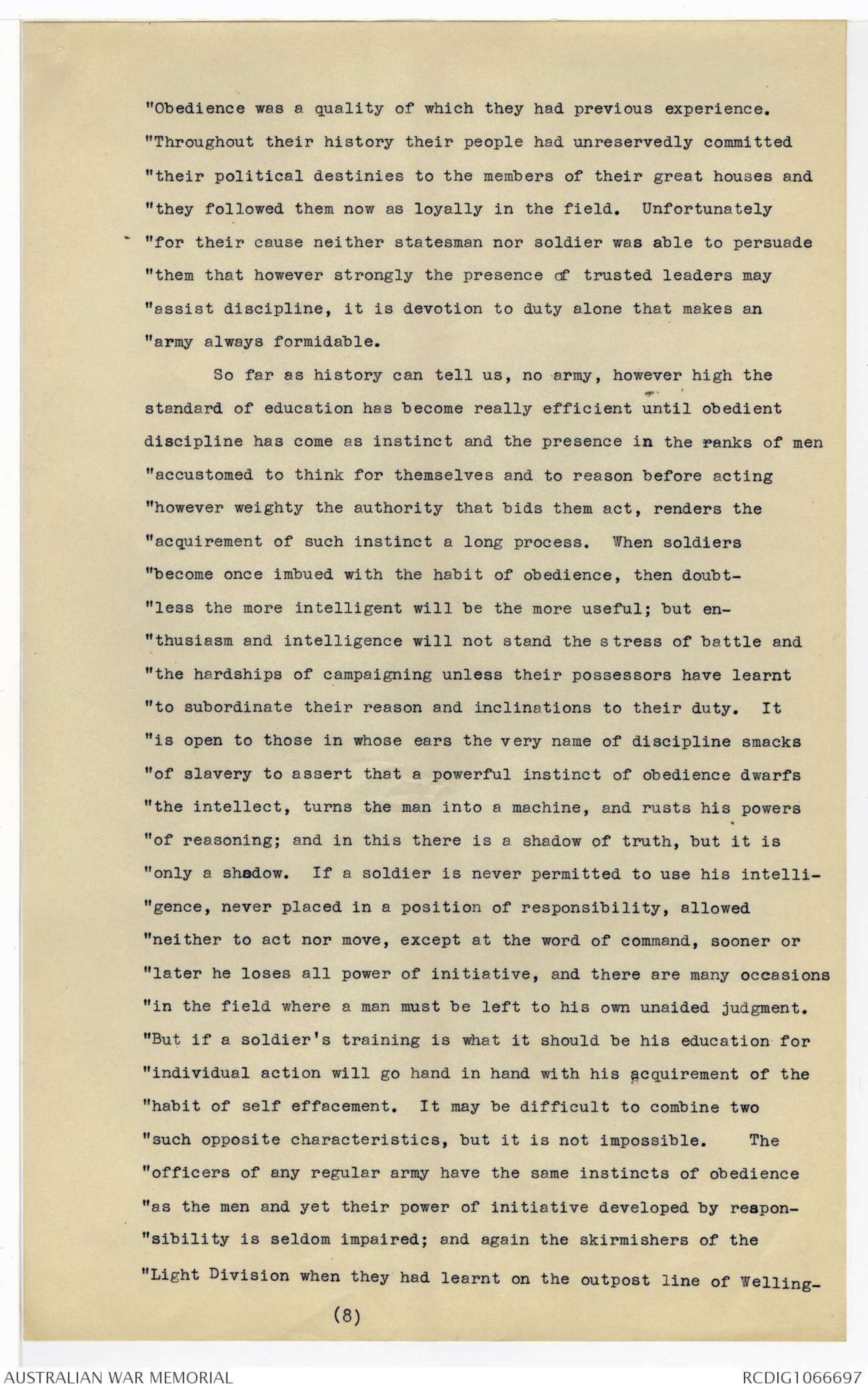
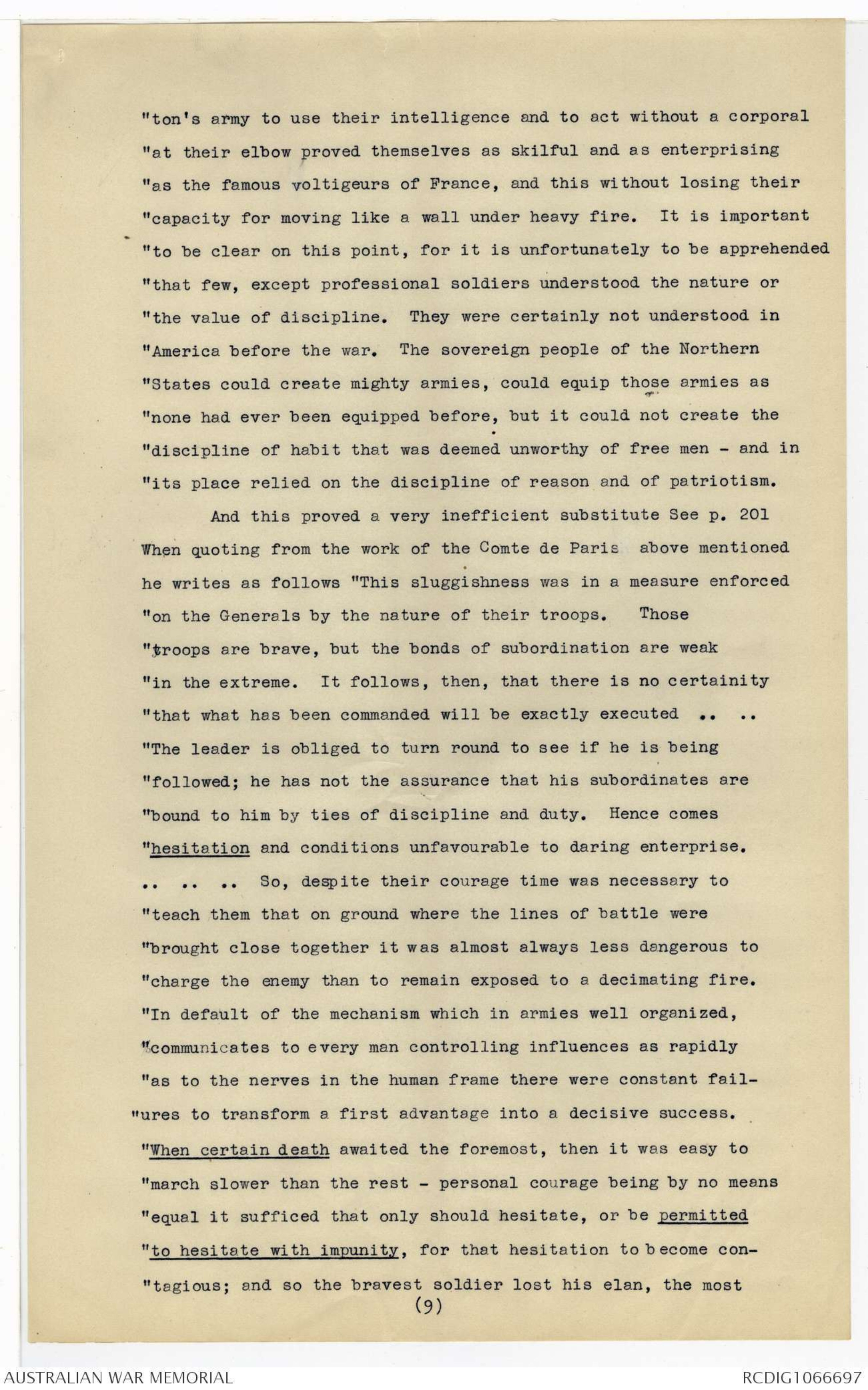
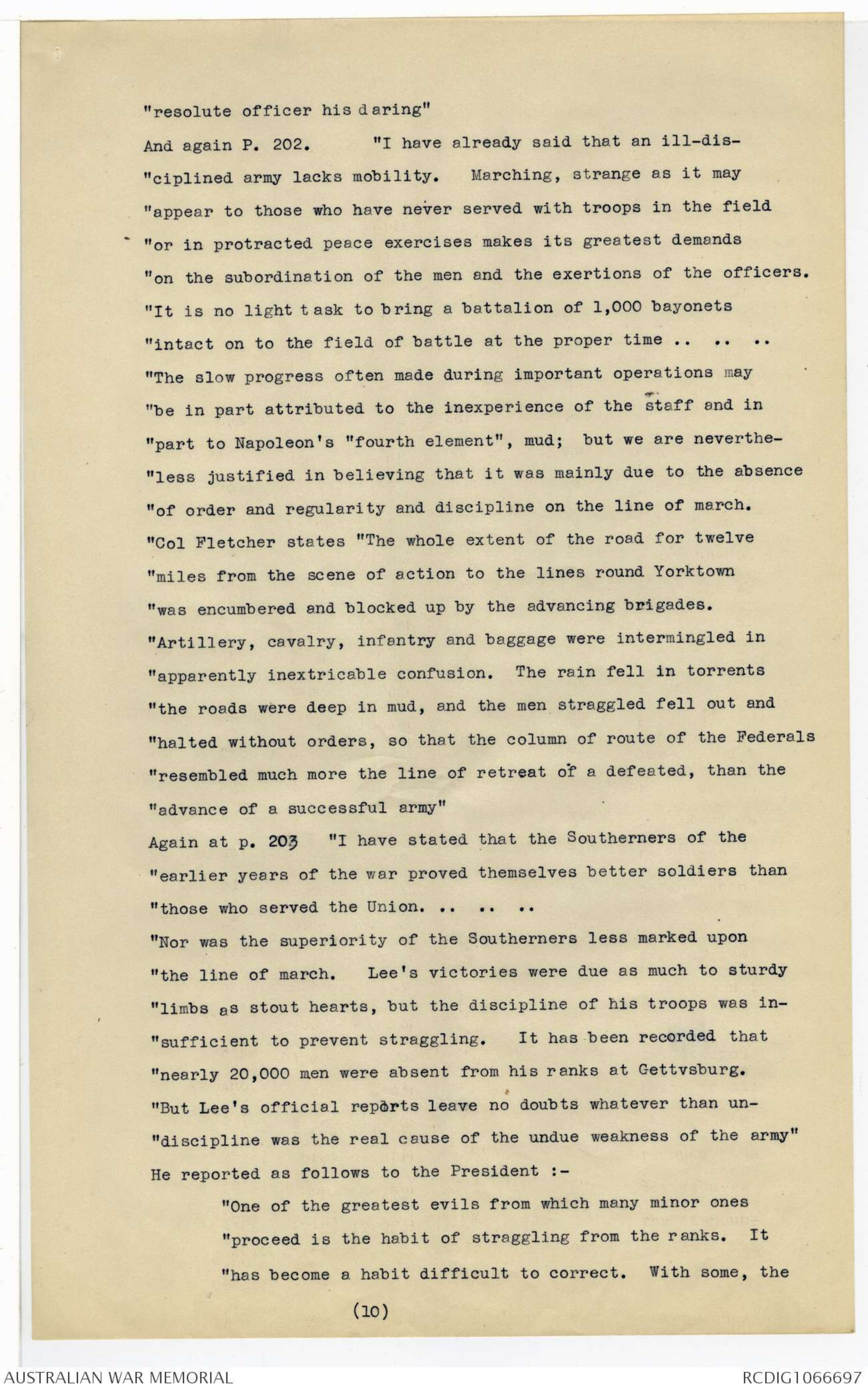
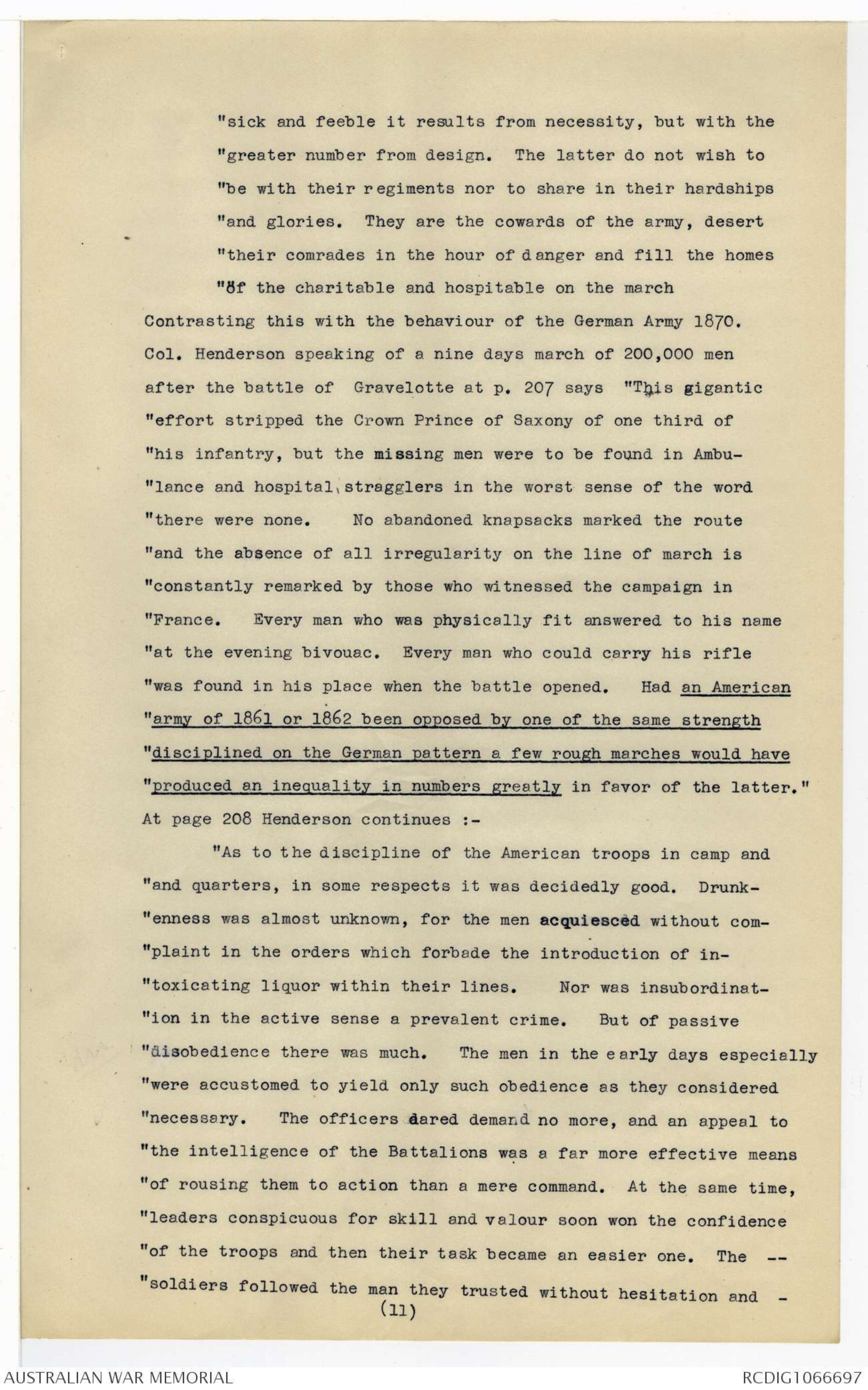
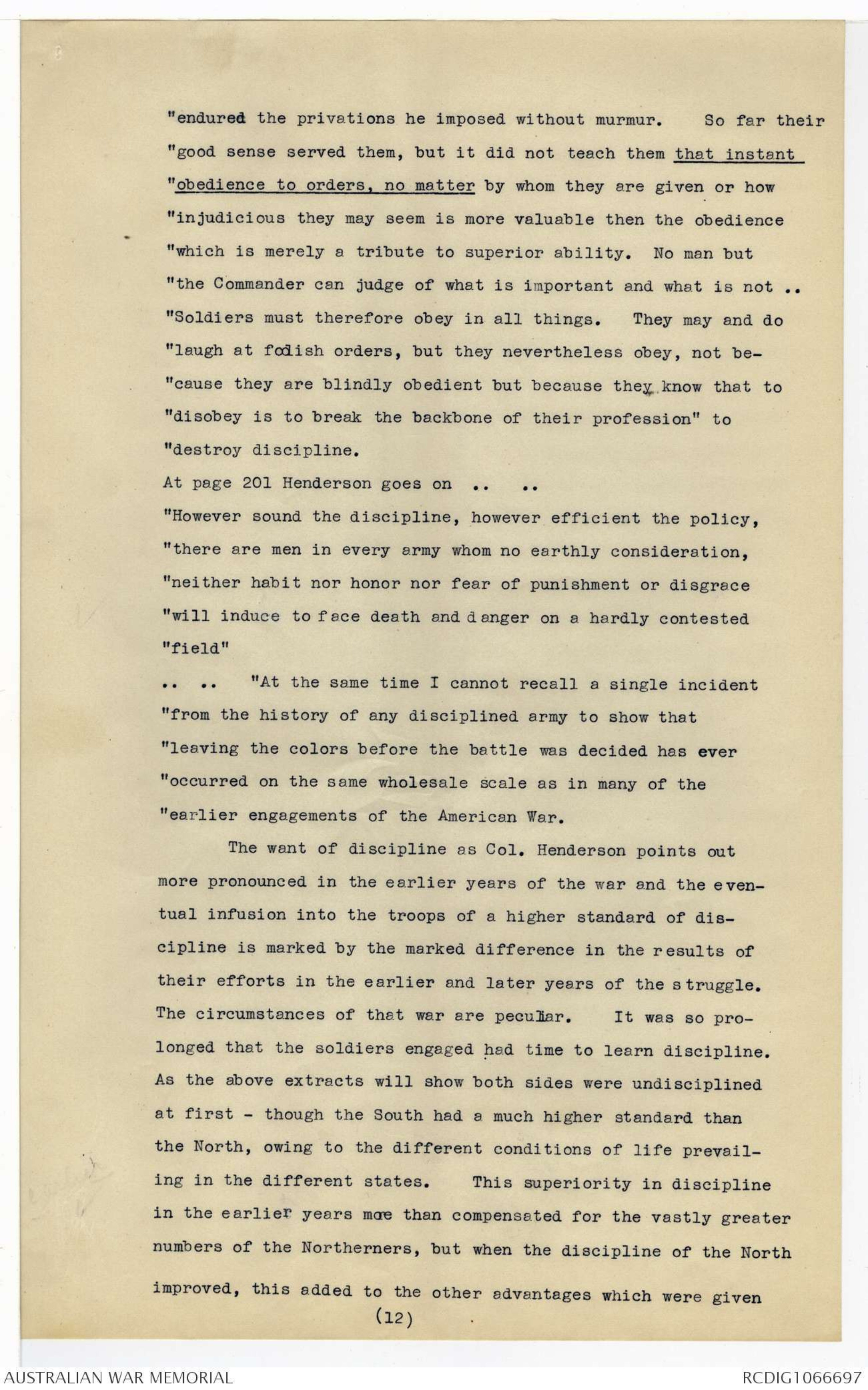
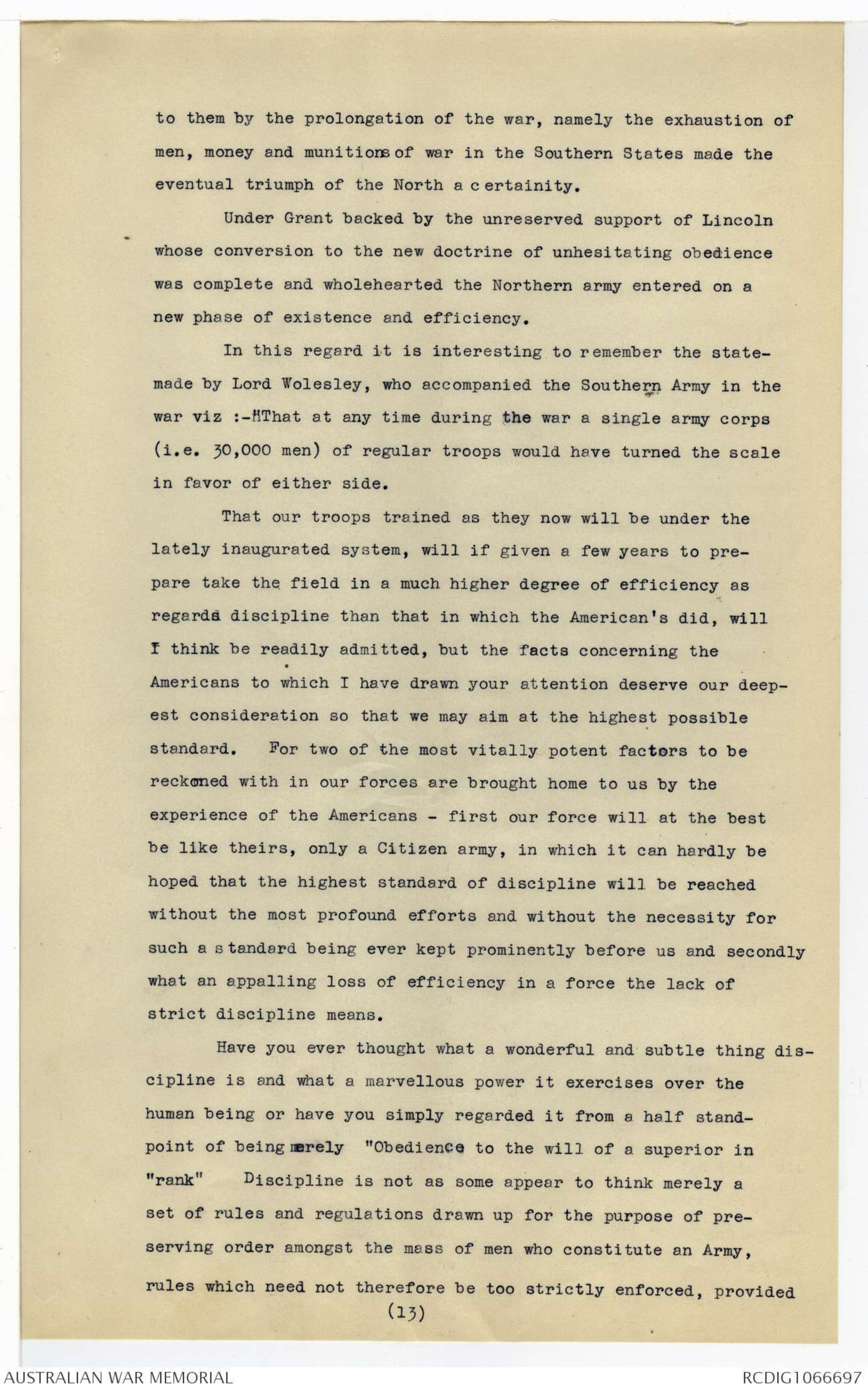
an
Speaking generally of unprofessional soldiers he says
(The Science of War p.37) "With good officers and a certain
"amount of previous training there is no reason why bodies of
"infantry artillery or mounted infantry, composed entirely of un-
"professional soldiers should not do excellent service in the field
"Where they are likely to fail is in discipline: and it would
"appear that at the beginning of a campaign they are more liable to
"panic less resolute in attack, less enduring under heavy losses,
"and much slower in manoeuvre than professionals."
Again at page 191 :- "In the Union States more intensely --
"democratic than the Confederate it by no means followed that the
"more experienced were placed in command. Commissions were given
"by the suffrages of the men in the ranks and officers who owed
"their positions to the favour of their former comrades were
"generally careful not to lose their popularity by the enforcement
"of an obnoxious discipline. The hold of the officers or
"their commands was thus of the slightest in the North and it was
"but little stronger in the South. The men resented obedience to
"those who were superior neither in social standing nor professional
"knowledge to themselves Of the regular officers available
"the Confederates mad the best use immediately assigning them
"to the command of Brigades and to posts in the general staff
"Nevertheless despite the presence of these trained instructors when
"the two principal armies met at Bull Run, an insignificant stream
"in Virginia within 30 miles of Washington the Union Capital on
"July 21st they both were weak in discipline and the event goes for
"to prove that ninety days of camp life were insufficient to give
"citizen soldiers more than the outward semblance of a regular army"
"As regards the actual fighting qualities of the men the
"battle was no discredit to either side. No discipline was the
"cause both of the defeat of the Northern and of the failure of
"the Southern to pursue.
"(We had good organisation, good men but no cohesion, no real
"discipline, no real knowledge of war. Both armies were fairly
"defeated and whichever had stood fast the other would have run.
(General W.T. Sherman)
(4)
Again at Page 193 "More noteworthy perhaps was the inability of the
"Federal troops although they had been exercised for the best part
"of three months in camp, to perform the very trifling marches
"necessary to bring them into contact with the enemy in good order
"and in good time".
"The march proceeding the battle demonstrated little less than
"the general laxity of discipline for with all my personal efforts
"I could not prevent men from straggling for water, blackberries
"or anything else they fancied (Gen Sherman)"
"General McDowell was anxious to reach Centreville on the
"17th and so to fight on the 19th instead of the 21st but the
"Regiments who had only marched from Vienna (six miles) were so
"fatigued that they either could not or would not push on 6 miles
"further the same evening. That fatigue was partially caused by
"delays and dawdlings consequent on the ignorance of the rules
"of marching on the part of the officers and by the undisciplined
"state of troops; and also by the absence of good marching
"qualities in Americans and their inability to carry even the
"slight weights required in light marching orders"
"Had the attack been made on the 19th the Northern Army could
"have been opposed by but half the number that were present on the
"21st" and therefore no doubt Bull Run would have been a victory
instead of a disaster to the Federalists.
Again at p. 194. " .. .. The efficiency of the officers and men
"is the subject of this enquiry and it is only right to state that
"in the desperate fighting round Richmond the troops showed far
"greater ability and endurance than those at Bull Run. At the
"same time they had not yet by any means attained either the con-
"sistency or the mobility of professional soldiers. The men had
"not yet acquired the habit of mechanical obedience which alone
"makes an army an effective weapon in the hands of its commander"
"Where duty becomes irksome it was neglected. Straggling in the line
"of march was a conspicuous evil. The details connected with sani-
"tation and the care of equipment were generally overlooked and the
"health of the troops and the efficiency of their arnaments suffered
"in consequence".
(5)
"Amongst the critics of the campaign are two experienced
"European soldiers the Comte de Paris and Colonel Fletcher. The
"one served on McClellan's staff during these operations, the other
"accompanied his army as a spectator. The French prince was
"prejudiced in favor of the North, the Englishman's sympathies were
"with the artistocracy of the South, but divergent as were their
"predilections, they are at one in pointing out that the bonds of
"discipline in the army of the Potamac as the force commanded by
"McClellan had come to be called, were weak in the extreme"
.. .. .. .. .. ..
"One of their most serious shortcomings was that on the field of
"battle the men were accustomed to conduct themselves in accordance
"rather with the dictates of their own judgment than with the orders
"of the superiors. At Cold Harbor where Lee struck the isolated
"right wing of the Federals and compelled McClellan to make his
"famous charge of base from the York to the James River, both sides
"fought with the greatest courage and persistance, and it was not
"until after seven (7) hours of battle that 50,000 Confederates
"drove 30,000 Unionists from their strong position on the left bank
"of the Chickahominy. General Porter commanding the Northern
"troops engaged had exhausted his reserves some time before his line
"yielded but fresh troops had been sent across the river by McClellan
"and an orderly retreat might easily have been effected for the
"Confederates were in no good trim for further action. As it was
"when the crash came no one could stop the torrent of fugitives,
"large numbers of men without order, with arms in their hands left
"the ranks and walked to the rear. Officers were intermingled with
"them in some instances, leading their companies away from instead
"of towards the enemy. There was little or no panic, the men said
"they were weary, had had enough fighting for the day or were in
"want of ammunition. Some squadrons of cavalry attempted to stop
"the fugitives, the officers threatening them with their revolvers,
"but all in vain .. .. ... The regular infantry regiments pre-
"served their discipline better than the volunteers (as they had
"done at Bull Run) and many without yielding to the influence of
"the now unduly spread panic, fell, disdaining to fly. At the
(6)
"stream the fugitives, ambulances and carriers (the guns themselves
"were abandoned) arrived at the other side of the Chickahominy, they
"were halted and formed into some sort of order by a line of sentries
"and strong patrols which guarded the bridge."
"Now this retreat from Cold Harbor did not resemble the route
"of Austerlitz or the debacle of Woerth. It was not the wild rush
"of a terror stricken mob seeking safety at any price as at Vittoria
"or Waterloo. It was not due to lack of courage or to demorali-
"but to defective discipline. But there is something more demanded
"zation from soldiers than the struggle for victory; there is the
"task of preventing defeat degenerating into irretrievable disaster.
"It was precisely this task that the Federals were incapable of
"executing. Men habituated to discipline when defeat stares them
"in the face, throng together, for they have imbibed the instinct
"that only in unity is there safety. They can trust their comrades
"and their commanders, they have learned the necessity of mutual
"support and the common danger serves but to bind the ranks closer
"But with troops half disciplined defeat for a time at least has the
"effect of disintegration; order vanishes and however great the
"courage of the individual soldier, a well trained enemy, vigorous
"in pursuit has such an army at his mercy. It is necessary
"therefore that soldiers should be capable of doing more than sus-
"taining the shock of combat. Every battle cannot be a victory, for
"war is the playground of fortune. An army must have stamina
"sufficient to preserve itself from annihilation and that stamina
"is given by discipline alone"
And at page 199 "Lastly as to discipline, whether we agree or not
"with Colonel Fletcher that the conditions of life in the South were
"the more favorable to military excellency we cannot neglect his
"conclusion that the rich planter possessing many slaves entirely
"dependent on him in regard to food, clothing medicine and dis-
"cipline acquired habits of command and organization highly useful
"to the officers of any army. Moreover, the population was as
"distinctly divided into classes as the subjects of a monarchy.
"The line of demarkation was strictly drawn and the social precedence
"of the old colonial families was undisputed. The Confederate
"States were free from the aggressive independence of the North.
(7)
"Obedience was a quality of which they had previous experience.
"Throughout their history their people had unreservedly committed
"their political destinies to the members of their great houses and
"they followed them now as loyally in the field. Unfortunately
"for their cause neither statesman nor soldier was able to persuade
"them that however strongly the presence of trusted leaders may
"assist discipline, it is devotion to duty alone that makes an
"army always formidable.
So far as history can tell us, no army, however high the
standard of education has become really efficient until obedient
discipline has come as instinct and the presence in the ranks of men
"accustomed to think for themselves and to reason before acting
"however weighty the authority that bids them act, renders the
"acquirement of such instinct a long process. When soldiers
"become once imbued with the habit of obedience, then doubt-
"less the more intelligent will be the more useful; but en-
"thusiasm and intelligence will not stand the stress of battle and
"the hardships of campaigning unless their possessors have learnt
"to subordinate their reason and inclinations to their duty. It
"is open to those in whose ears the very name of discipline smacks
"of slavery to assert that a powerful instinct of obedience dwarfs
"the intellect, turns the man into a machine, and rusts his powers
"of reasoning; and in this there is a shadow of truth, but it is
"only a shadow. If a soldier is never permitted to use his intelli-
"gence, never placed in a position of responsibility, allowed
"neither to act nor move, except at the word of command, sooner or
"later he loses all power of initiative, and there are many occasions
"in the field where a man must be left to his own unaided judgment.
"But if a soldier's training is what it should be his education for
"individual action will go hand in hand with his acquirement of the
"habit of self effacement. It may be difficult to combine two
"such opposite characteristics, but it is not impossible. The
"officers of any regular army have the same instincts of obedience
"as the men and yet their power of initiative developed by respon-
"siblity is seldom impaired; and again the skirmishers of the
"Light Division when they had learnt on the outpost line of Welling-
(8)
"ton's army to use their intelligence and to act without a corporal
"at their elbow proved themselves as skilful and as enterprising
"as the famous voltigeurs of France, and this without losing their
"capacity for moving like a wall under heavy fire. It is important
"to be clear on this point, for it is unfortunately to be apprehended
"that few, except professional soldiers understood the nature or
"the value of discipline. They were certainly not understood in
"America before the war. The sovereign people of the Northern
"States could create mighty armies, could equip those armies as
"none had ever been equipped before, but it could not create the
"discipline of habit that was deemed unworthy of free men - and in
"its place relied on the discipline of reason and of patriotism.
And this proved a very inefficient substitute See p. 201
When quoting from the work of the Comte de Paris above mentioned
he writes as follows "This sluggishness was in a measure enforced
"on the Generals by the nature of their troops. Those
"troops are brave, but the bonds of subordination are weak
"in the extreme. It follows, then, that there is not certainity
"that what has been commanded will be exactly executed .. ..
"The leader is obliged to turn round to see if he is being
"followed; he has not the assurance that his subordinates are
"bound to him by ties of discipline and duty. Hence comes
"hesitation and conditions unfavourable to daring enterprise.
.. .. .. So, despite their courage time was necessary to
"teach them that on ground where the lines of battle were
"brought close together it was almost always less dangerous to
"charge the enemy than to remain exposed to a decimating fire.
"In default of the mechanism which in armies well organized,
"communicates to every man controlling influences as rapidly
"as to the nerves in the human frame there were constant fail-
"ures to transform a first advantage into a decisive success.
"When certain death awaited the foremost, then it was easy to
"march slower than the rest - personal courage being by no means
"equal it sufficed that only should hesitate, or be permitted
"to hesitate with impunity, for that hesitation to become con-
"tagious; and so the bravest soldier lost his elan, the most
(9)
"resolute officer his daring"
And again P. 202. "I have already said that an ill-dis-
"ciplined army lacks mobility. Marching, strange as it may
"appear to those who have never served with troops in the field
"or in protracted peace exercises makes its greatest demands
"on the subordination of the men and the extertions of the officers.
"It is no light task to bring a battalion of 1,000 bayonets
"intact on to the field of battle at the proper time .. ... ..
"The slow progress often made during important operations may
"be in part attributed to the inexperience of the staff and in
"part to Naopleon's "fourth element", mud; but we are neverthe-
"less justified in believing that it was mainly due to the absence
"of order and regularity and discipline on the line of march.
"Col Fletcher states "The whole extent of the road for twelve
"miles from the scene of action to the lines round Yorktown
"was encumbered and blocked up by the advancing brigades.
"Artillery, cavalry, infantry and baggage were intermingled in
"apparently inextricable confusion. The rain fell in torrents
"the roads were deep in mud, and the men straggled fell out and
"halted without orders, so that the column of route of the Federals
"resembled much more the line of retreat of a defeated, than te
"advance of a successful army"
Again at p.203 "I have stated that the Southerners of the
"earlier years of the war proved themselves better soldiers than
"those who served the Union. .. .. ..
"Nor was the superiority of the Southerners less marked upon
"the line of march. Lee's victories were due as much to sturdy
"limbs as stout hearts, but the discipline of his troops was in-
"sufficient to prevent straggling. It has been recorded that
"nearly 20,000 men were absent from his ranks at Gettysburg.
"But Lee's official reports leave no doubts whatever than un-
"discipline was the real cause of the undue weakness of the army"
He reported as follows to the President :-
"One of the greatest evils from which many minor ones
"proceed is the habit of straggling from the ranks. It
"has become a habit difficult to correct. With some, the
(10)
"sick and feeble it results from necessity, but with the
"greater number from design. The latter do not wish to
"be with their regiments nor to share in their hardships
"and glories. They are the cowards of the army, desert
"their comrades in the hour of danger and fill the homes
"of the charitable and hospitable on the march
Contrasting this with the behaviour of the German Army 1870.
Col. Henderson speaking of a nine days march of 200,000 men
after the battle of Gravelotte at p. 207 says "This gigantic
"effort stripped the Crown Prince of Saxony of one third of
"his infantry, but the missing men were to be found in Ambu-
"lance and hospital stragglers in the worst sense of the word
"there were none. No abandoned knapsacks marked the route
"and the absence of all irregularity on the line of march is
"constantly remared by those who witnessed the campaign in
"France. Every man who was physically fit answered to his name
"at the evening bivouac. Every man who could carry his rifle
"was found in his place when the battle opened. Hand an American
"army of 1861 or 1862 been opposed by one of the same strength
"disciplined on the German pattern a few rough marches would have
"produced an inequality in numbers greatly in favor of the latter."
At page 208 Henderson continues:-
"As to the discipline of the American troops in camp and
"and quarters, in some respects it was decidedly good. Drunk-
"enness was almost unknown, for the men acquiesced without com-
"plaint in the orders which forbade the introduction of in-
"toxicating liquor within their lines. Nor was insubordinat-
"ion in the active sense a prevalent crime. But of passive
"disobedience there was much. The men in the early days especially
"were accustomed to yield only such obedience as they considered
"necessary. The officers dared demand no more, and an appeal to
"the intelligence of the Battalions was a far more effective means
"of rousing them to action than a mere command. At the same time,
"leaders conspicuous for skill and valour soon won the confidence
"of the troops and then their task became an easier one. The --
"soldiers followed the man they trusted without hesitation and -
(11)
"endured the privations he imposed without murmur. So far their
"good sense served them, but it did not teach them that instant
"obedience to orders, no matter by whom they are given or how
"injudicious they may seem is more valuable then the obedience
"which is merely a tribute to superior ability. No man but
"the Commander can judge of what is important and what is not . .
"Soldiers must therefore obey in all things. They may and do
"laugh at foolish orders, but they nevertheless obey, not be-
"cause they are blindly obedient but because they know that to
"disobey is to break the backbone of their profession" to
"destroy discipline.
At page 201 Henderson goes on .. ..
"However sound the discipline, however efficient the policy,
"there are men in every army whom no earthly consideration,
"neither habit nor honor nor fear of punishment of disgrace
"will induce to face death and danger on a hardly contested
"field"
.. .. "At the same time I cannot recall a single incident
"from the history of any disciplined army to show that
"leaving the colors before the battle was decided has ever
"occurred on the same wholesale scale as in many of the
"earlier engagements of the American War.
The want of discipline as Col. Henderson points out
more pronounced in the earlier years of the war and the even-
tual infusion into the troops of a higher standard of dis-
cipline is marked by the marked difference in the results of
their efforts in the earlier and later years of the struggle.
The circumstances of that war are peculiar. It was so pro-
longed that the soldiers engaged had time to learn discipline.
As the above extracts will show both sides were undisciplined
at first - though the South had a much higher standard than
the North, owing to the different conditions of life prevail-
ing in the different states. This superiority in discipline
in the earlier years more than compensated for the vastly greater
numbers of the Northerners, but when the discipline of the North
improved, this added to the other advantages which were given
(12)
to them by the prolongation of the war, namely the exhaustion of
men, money and munitions of war in the Southern States made the
eventual triumph of the North a certainity.
Under Grant backed by the unreserved support of Lincoln
whose conversion to the new doctrine of unhesitating obedience
was complete and wholehearted the Northern army entered on a
new phase of existence and efficiency.
In this regard it is interesting to remember the state-
made by Lord Wolesley, who accompanied the Southern Army in the
war viz: That at any time during the war a single army corps
(i.e. 30,000 men) of regular troops would have turned the scale
in favor of either side.
That our troops trained as they now will be under the
lately inaugurated system, will if given a few years to pre-
pare take the field in a much higher degree of efficiency as
regards discipline than that in which the American's did, will
I think be readily admitted, but the facts concerning the
Americans to which I have drawn your attention deserve our deep-
est consideration so that we may aim at the highest possible
standard. For two of the most vitally potent factors to be
reckoned with in our forces are brought home to us by the
experience of the Americans - first our force will at the best
be like theirs, only a Citizen army, in which it can hardly be
hoped that the highest standard of discipline will be reached
without the most profound efforts and without the necessity for
such a standard being ever kept prominently before us and secondly
what an appalling loss of efficiency in a force the lack of
strict discipline means.
Have you ever thought what a wonderful and subtle thing dis-
cipline is and what a marvellous power it exercises over the
human being or have you simply regarded it from a half stand-
point of being merely "Obedience to the will of a superior in
"rank" Discipline is not as some appear to think merely a
set of rules and regulations drawn up for the purpose of pre-
serving order amongst the mass of men who constitute an Army,
rules which need not therefore be too strictly enforced, provided
(13)
 Sam scott
Sam scottThis transcription item is now locked to you for editing. To release the lock either Save your changes or Cancel.
This lock will be automatically released after 60 minutes of inactivity.